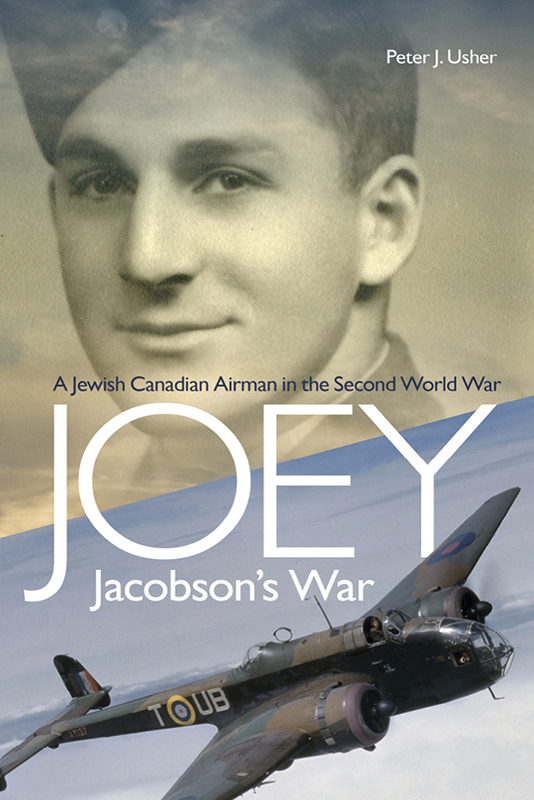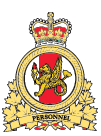Book Reviews

Joey Jacobson’s War: A Jewish Canadian Airman in the Second World War
by Peter J. Usher
Waterloo, ON, Wilfrid Laurier University Press, 2018
395 pages, $29.99 (soft cover)
ISBN 978-1-77112-342-6
For more information on accessing this file, please visit our help page.
Reviewed by David L. Bashow
Author Peter Usher was born in Montréal in 1941, the infant cousin of Joey Jacobson, who went overseas and into combat that same year. Drawing upon Cousin Joey’s diary and letters for inspiration, he began researching and chronicling the experiences of Canada’s airmen in the Second World War, and in particular, the early years of the bombing campaign. The letters and the diary entries, which commence shortly after Joey’s student days at McGill University, along with his own extensive research, would have a profound impact upon Usher. In his own words: “By virtue of my undertaking, Joey came alive and immediate to me in a way that any other uncles (middle-aged men when I was a boy) never had. I liked them, of course, but a generation stood between us. Joey’s letters and diaries revealed a vibrant young man in whom I could recognize something of myself at that age. But he had been confronted by circumstances that I had not. And so, I came to see and also to wonder about what I too had lost, and to grieve for the man I never met.”
This is a wonderful book for many reasons, including the depth of meticulous research conducted by the author. However, its uniqueness does indeed rest in the first-person narratives of Joey’s diary and note book entries, and the letters to and from his friends, and, most particularly, those to his father. And the great strength of these writings is that they were written very much ‘in the now,’ and not encumbered by the passage of time, faded recollections, and perhaps, the sober reconsideration of issues after years of musing about occurrences long since passed. Joey was a prolific and very skilled writer, fascinated by the world around him, the great events that were unfolding all around him and his place within in them, including what the future might offer.
Peter Usher’s sources are extensive and varied. The diary and letter components, which this reviewer believes constitute the very heart and soul of the book, are skilfully blended with a wealth of both primary and secondary sources to effectively situate the letter and diary entries in space and time, collectively forming a rich tapestry of a young Canadian’s short but incredibly full life.
Joey Jacobson was born in Montréal of a successful middle-class Jewish family in 1919, shortly after the end of ‘the war to end all wars.’ A star athlete on the McGill Redmen football team, he graduated from that university with a Bachelor of Commerce degree in 1939. Poised to join and advance in his father’s successful office furniture business, the Second World War soon intervened, and Joey’s sense of adventure, coupled with a patriotic spirit bolstered by a profound sense of duty to take the fight to the enemy by virtue of his faith, beckoned him to the colours. Upon joining the RCAF, he trained as an air observer and deployed overseas in early-1941. After further training in England, Joey joined 106 Squadron of 5 Group within Bomber Command, flying in twin-engine Handley Page Hampdens as part of the Command’s nascent air offensive against Nazi Germany. During the following months, Joey’s letters and diary entries would contain a wealth of thoughtful and articulate considerations of myriad impressions, viewpoints, and concerns, for he was a very skilled writer, possessed of a keen, inquiring mind and an unquenchable thirst for knowledge and meaning in life. Through it all, Joey radiates a great love of life and friendships, an unequivocal faith in the legitimacy of the Allied cause, and a profound desire to help make the world a better place, both at the time and in the future, and by extension, his place in that future world. And yet, and with increasing awareness throughout his operational tour and the realities of the dangers he continuously faced in combat, he was pragmatic enough to realize that he might not survive the conflict within which he was both deeply embedded and committed. Regrettably, his misgivings would hold true, and he would perish, along with the three other members of his crew, on 28 January 1942, after a crash landing in a winter field in Holland on his 24th operational mission.
Recurring themes in Joey’s correspondence and diaries revolve around the national characteristics of the various combatants, “…as these might affect the war’s outcome,” the perceived need for the United States to commit to the war and throw its weight behind Britain, and while he professed great praise for the British people in general, “…the dead weight of the class system in Britain.” Hand-in-hand with the candour of this young Canadian’s written observations exists a need to appreciate the relative infancy of the bombing campaign during which time Joey’s observations were penned, for such written observations of that dark period are rare indeed. Readers must bear in mind that these very early months of Bomber Command’s air offensive were generally rudimentary and ineffective, a mere shadow of what the air offensive would eventually become. Joey Jacobson’s observations speak volumes of those actually prosecuting the war at the time, and the need for change and improvements in many directions.
In closing, this book is a true gift in the uniqueness of its perspective, and it is highly recommended reading.
Lieutenant-Colonel (Ret’d) David L. Bashow, OMM, CD, has written extensively on the history of Canadian military aviation, with an emphasis upon Bomber Command’s Second World War offensive operations. His work in that field includes No Prouder Place ~ Canadians and the Bomber Command Experience., 1939-1945. David is currently the Editor-in-Chief of the Canadian Military Journal, and an Associate Professor at the Royal Military College of Canada.







